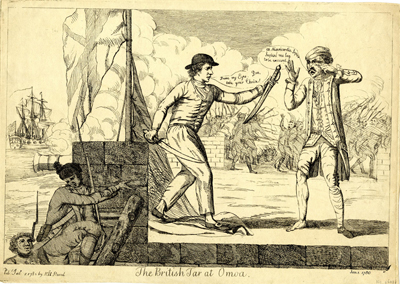The British Tar at Omoa
After reports of various British losses at the hands of Spain and France who had aligned themselves with America against Britain in the American Revolutionary War, it was a relief to the British populace in December 1779 to hear news of a victory over Spain in the British capture of the fortress of Omoa on the northern coast of Honduras.
This print celebrates an incident that occurred during the attack. It is based on an extract of a letter dated October 21 at Omoa (a few days after the capture) from Captain Dalrymple, Commandant of the Loyal Irish volunteers to the Right Hon. Lord Germain, Secretary of State for the Colonies, published in the official government newspaper, the London Gazette on December 18, 1779. But it was immediately picked up and reprinted by other newspapers, including the London Evening Post, December 18, 1779 quoted here. In detailing the stealthy march towards the fortress at 4 AM and the subsequent surprise attack using ladders to scale the 28 foot walls, Captain Dalrymple allowed himself the following digression:
Your Lordship will pardon my mentioning an instance of an elevated mind in a British tar which amazed the Spaniards, and gave them a very high idea of English valour. Not contented with one cutlass, he had scrambled up the walls with two; and meeting a Spanish officer without arms, who had been roused out of his sleep, had the generosity not to take any advantage, but presenting him one of his cutlasses told him "You are now on a footing with me."

© Trustees of the British Museum
In addition to more or less accurately portraying that example of a distinctly British sense of fair play, the rest of the print also reflects details from Dalrymple's report, including the support from the British navy, the use of "ladders" to reach the parapet, the "consternation of the enemy," and disorderly flight of some 100 of the Spaniards.
The fact that the print and its companion, John Bull Triumphant are relatively rare however, may be attributed to the fact that the victory was very short lived. News, of course, traveled very slowly in 1779/80, so even before the first accounts of the victory had reached London, the Briitish had been forced to abandon Omoa and the fortress was back in Spanish hands (Nov. 29).
Sources and Reading
- Commentary from the British Museum on The British Tar at Omoa.
- "Battle of San Fernando de Omoa," Wikipedia
Comments & Corrections
NOTE: Comments and/or corrections are always appreciated. To make that easier, I have included a form below that you can use. I promise never to share any of the info provided without your express permission.